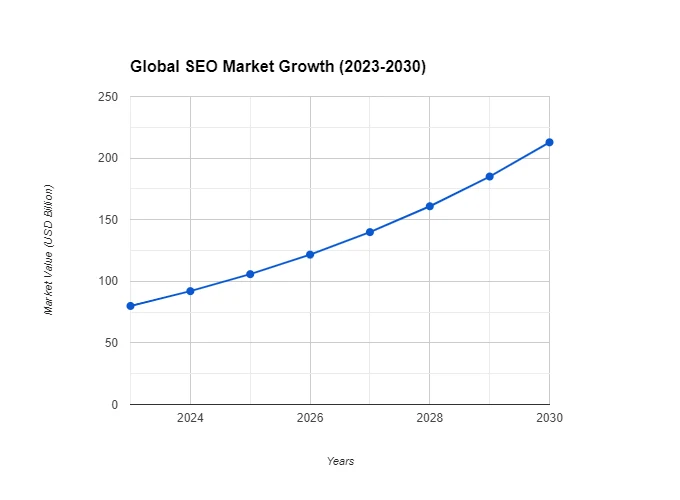The Power of Branded Keyword SEO in 2025
In the ever-evolving digital landscape, establishing a robust online presence is crucial for businesses of all sizes. As consumers increasingly rely on search engines to find information, products, and services, the significance of effective search engine optimization (SEO) becomes paramount. One of the most impactful strategies within SEO is “branded keyword SEO” – the practice of optimizing content for search terms that include a brand’s name.
Understanding Branded Keyword SEO With Examples
Branded keyword SEO focuses on optimizing online content for keywords that explicitly include a company’s name or its products. For instance, searches like “Nike sneakers” or “Apple iPhone” fall under this category. These keywords are essential for businesses aiming to capture high-intent traffic—users who are often closer to making a purchase decision.
Importance of Branded Keywords in SEO
- Enhanced Brand Recognition: Regular visibility in search results reinforces brand identity and helps build a loyal customer base. Brands that appear consistently for their branded keywords can significantly increase consumer trust and recognition.
- Higher Click-Through Rates (CTR): Searches containing branded keywords typically yield higher CTRs compared to non-branded terms. Campaigns targeting branded keywords often see CTRs exceeding 30%, which is substantially higher than the industry average for non-branded keywords.
- Improved Conversion Rates: Users searching for branded terms are often further along in the buying process, making them more likely to convert. For instance, branded searches can lead to conversion rates as high as 25% compared to just 2% for generic searches.
Market Trends in Branded Keyword SEO in 2024
Several key trends are shaping the future of branded keyword SEO:
Rise of AI and Automation
The integration of AI tools in SEO strategies is reshaping how businesses approach branded keyword optimization. AI-driven analytics provide deeper insights into consumer behavior, enabling brands to tailor their content more effectively. Companies utilizing AI for SEO report up to a 40% increase in organic traffic within six months of implementation.
Voice Search Optimization
With the proliferation of voice-activated devices, optimizing for voice search has become essential. Research indicates that over 55% of households are expected to own smart speakers by 2025. This shift requires brands to focus on long-tail keywords and conversational phrases that align with how consumers verbally express their queries.
Emphasis on User Intent
Understanding user intent is becoming increasingly important in SEO strategies. Brands must analyze search behavior data to create content that meets the specific needs and motivations of their audience. By aligning branded keywords with user intent, companies can enhance engagement and satisfaction levels.
Content Quality Over Quantity
Search engines are prioritizing high-quality content over sheer volume. Brands that invest in creating authoritative and informative content linked to their branded keywords are more likely to improve their rankings and visibility in SERPs.
Interactive Content Engagement
Interactive content such as quizzes, polls, and videos is gaining traction as a means to engage users effectively. Incorporating interactive elements into branded keyword strategies can increase user engagement by up to 80%, leading to improved retention rates and conversions.
Market Insights: Growth Potential and Market Share
Current Market Landscape
The global SEO market was valued at approximately $80 billion in 2023 and is projected to grow at a compound annual growth rate (CAGR) of 15% through 2030. A significant portion of this growth is attributed to the increasing importance of branded keyword strategies as businesses recognize the value of capturing high-intent traffic.

Competitive Analysis
Branded keywords also play a critical role in competitive analysis. By monitoring how competitors leverage their branded keywords, businesses can identify gaps in their own strategies and capitalize on emerging opportunities. Tools like SEMrush and Google Analytics provide valuable insights into competitor performance concerning branded queries.
Difference Between Branded and Non-Branded
Must Read: Measuring the Success of Your Digital Marketing Campaign in 2025
Keywords
Branded and non-branded keywords are essential concepts in search engine optimization (SEO) and pay-per-click (PPC) advertising. Understanding the distinction between these two types of keywords can significantly influence marketing strategies and user engagement.
- Branded Keywords: These are search terms that include a specific brand name or variations of it. For example, “Nike shoes” or “iPhone 15” are branded keywords. Users searching for these terms are typically already familiar with the brand and may be closer to making a purchase decision
- Non-Branded Keywords: In contrast, non-branded keywords do not mention any brand name. They are more general terms like “running shoes” or “smartphones.” These keywords attract users who may not yet be aware of specific brands but are searching for products or services within a particular category
Shortlisting The Right Branded Keyword SEO
Identifying the right keywords is crucial for optimizing your content effectively:
Primary Keywords
- Brand Name: Always include your brand name (e.g., “Nike,” “Apple”).
- Product Names: Use specific product names (e.g., “Nike Air Max,” “Apple MacBook Pro”).
Long-Tail Keywords
These are longer phrases that include your brand name along with specific product features or benefits (e.g., “buy Nike running shoes online,” “Apple iPhone camera quality”).
Related Keywords
– Identify related terms that potential customers might use when searching for your products (e.g., “athletic footwear,” “smartphone features”).
Effective Branded Keyword SEO Strategy
To harness the full potential of branded keyword SEO, businesses should implement several key strategies:
Comprehensive Keyword Research
Conduct thorough keyword research using tools like Google Keyword Planner or SEMrush to identify relevant branded keywords that resonate with your target audience.
On-Page Optimization Techniques
Once you have identified your target keywords, incorporate them into critical areas of your website:
- Title Tags: Ensure that your title tags include primary branded keywords.
- Meta Descriptions: Write compelling meta descriptions featuring your brand name.
- Headers: Use headers strategically throughout your content to improve readability while including relevant keywords.
- Body Text: Naturally integrate branded Keywords into your content without compromising quality or readability.
Technical SEO Enhancements
Ensure that your website meets technical SEO standards by focusing on factors such as:
- Site Speed: A fast-loading website improves user experience.
- Mobile Optimization: Ensure your website is mobile-friendly.
- Structured Data Markup: Implementing structured data helps search engines better understand your content.
Local SEO Strategies
For businesses with physical locations local seo services is a result generator:
- Claim and optimize your Google My Business listing.
- Ensure consistent information across various online directories about your business name, address, phone number (NAP), and website URL.
- Create localized content that speaks directly to local audiences by incorporating geographical references alongside branded keywords.
Continuous Monitoring and Adaptation
Regularly track the performance of your branded keyword strategy using tools like Google Analytics or Ahrefs:
- Monitor how well you’re ranking for targeted branded keywords over time.
- Identify which channels are driving traffic related to your branded searches.
- Assess conversion rates from branded searches compared to other sources.
Branded keyword SEO Case Studies: Success Stories
- Nike: Nike has effectively utilized branded keyword SEO to dominate the athletic footwear market. Their strategic focus on terms like “Nike Air Max” has resulted in substantial online sales growth and brand loyalty.
- Apple: Apple’s consistent ranking for branded searches such as “Apple iPhone” reinforces its market dominance while driving significant traffic to its website.
Conclusion
Branded keyword SEO is an invaluable strategy for businesses looking to enhance their online presence, improve brand recognition, and drive conversions. As market trends continue to evolve with advancements in technology and shifts in consumer behavior, companies must remain agile in adapting their strategies.
By focusing on comprehensive keyword research, on-page optimization techniques, technical enhancements, local strategies, and continuous monitoring efforts, businesses can effectively leverage branded keywords to capture high-intent traffic and achieve sustained growth in an increasingly competitive digital landscape.
Investing in a robust branded keyword strategy not only positions your brand favorably within search results but also fosters long-term customer loyalty—a crucial factor for success in today’s market environment. As you navigate this dynamic landscape, remember that effective branding through targeted keyword optimization can set you apart from competitors while driving meaningful engagement with your audience.




